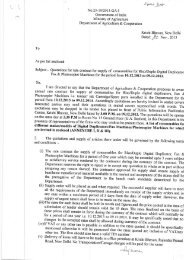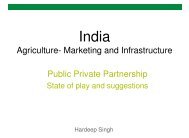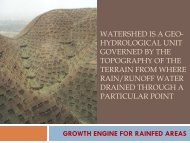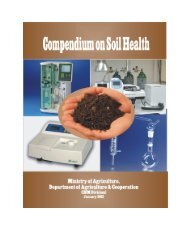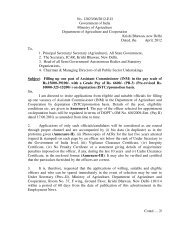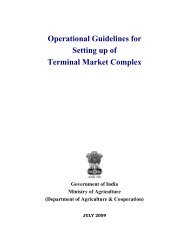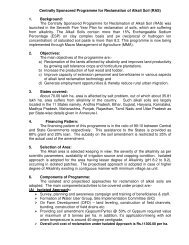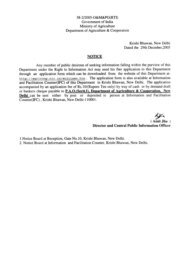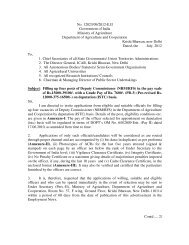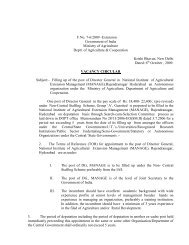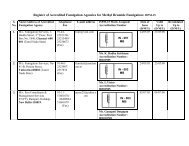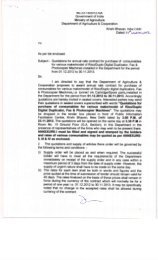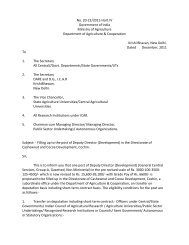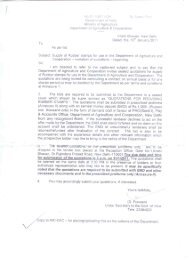Annual Report 2009-2010 - Department of Agriculture & Co-operation
Annual Report 2009-2010 - Department of Agriculture & Co-operation
Annual Report 2009-2010 - Department of Agriculture & Co-operation
You also want an ePaper? Increase the reach of your titles
YUMPU automatically turns print PDFs into web optimized ePapers that Google loves.
<strong>Annual</strong> <strong>Report</strong> <strong>2009</strong>-<strong>2010</strong><br />
68<br />
11.5 Agricultural trade during 2008-09 shows<br />
a healthy balance, which can be boosted further<br />
if the export <strong>of</strong> traditional and new agricultural<br />
products like marine products, rice (basmati),<br />
other cereals, tea, c<strong>of</strong>fee, cashew nuts, oil meals,<br />
floriculture, cotton, niger seed, etc., can be<br />
increased further.<br />
11.6. The post Uruguay round experience has<br />
been a mixed one for agricultural trade in India.<br />
While exports in certain areas, have registered a<br />
high growth, in certain other areas, the growth<br />
rate has not been satisfactory. Exports <strong>of</strong> rice<br />
(basmati and non-basmati), c<strong>of</strong>fee, tobacco, dairy<br />
and poultry products, spices, groundnut, guar<br />
gum meal, oil meal, fresh fruits and vegetables,<br />
meat and its preparations, raw cotton including<br />
waste, and paper/wood products have shown<br />
significant growth. Exports <strong>of</strong> pulses, castor oil,<br />
and marine products have not shown significant<br />
growth. At the global level, average bound tariffs<br />
have been reduced in the Uruguay round.<br />
However, measures like, tariff escalation, variable<br />
tariffs, complex tariffs and also certain nontechnical<br />
barriers still persist. Domestic support<br />
and export subsidies continue to remain high in<br />
a few developed countries. For most high-value<br />
agricultural products, including fruits and<br />
vegetables, fish, beef, poultry products, and<br />
spices, many importing countries have<br />
developed new standards, besides tightening<br />
existing standards. These factors have acted as<br />
inhibiting forces in actualising the export growth<br />
potential <strong>of</strong> the country. Other factors that have<br />
led to limited exports, include infrastructure<br />
inadequacies, poor quality awareness, and poor<br />
post-harvest management.<br />
11.7 Globalisation has led to increased<br />
competition from international markets and<br />
pressure to dismantle protectionist instruments.<br />
Since agriculture in India is more a matter <strong>of</strong><br />
livelihood than a commercial venture, it is<br />
necessary to build capacities in the system so<br />
that it is able to withstand the forces <strong>of</strong><br />
globalisation and compete wherever possible.<br />
While there are a large number <strong>of</strong> issues to be<br />
addressed at the micro and macro levels, the<br />
Capacity Building to Enhance the<br />
<strong>Co</strong>mpetitiveness <strong>of</strong> Indian <strong>Agriculture</strong> and<br />
Registration <strong>of</strong> Organic Products Abroad scheme<br />
aims to address some <strong>of</strong> the limited micro-level<br />
capacity creation issues. The capacity building<br />
under this scheme may be in the form <strong>of</strong><br />
academic, relevant research, market surveys<br />
(domestic and international), or in the form <strong>of</strong><br />
creation <strong>of</strong> physical assets critical to agriculture<br />
in the international context.<br />
11.8 The EC-India Joint Working Group on<br />
<strong>Agriculture</strong> and Marine Products has been set<br />
up in the <strong>Department</strong> <strong>of</strong> <strong>Agriculture</strong> and<br />
<strong>Co</strong><strong>operation</strong> for facilitating and promoting<br />
agricultural trade between India and the<br />
European Union. The 3rd meeting <strong>of</strong> the Joint<br />
Working Group was held in New Delhi on 14<br />
October <strong>2009</strong> to discuss agricultural policies,<br />
growth in bilateral trade, and issues <strong>of</strong> mutual<br />
interest related to agricultural trade.<br />
11.9 Negotiations on PTAs/FTAs are at various<br />
stages <strong>of</strong> progress with MERCOSUR (Brazil,<br />
Argentina, Paraguay, and Uruguay), BIMSTEC<br />
(Bangladesh, Bhutan, Myanmar, Nepal, Sri Lanka<br />
and Thailand), the Gulf <strong>Co</strong><strong>operation</strong> <strong>Co</strong>uncil<br />
(Kuwait, Bahrain, Qatar, Oman, Saudi Arabia, and<br />
the United Arab Emirates), Thailand, and the<br />
European Union. India has signed the Trade in<br />
Goods Agreement with ASEAN countries and a<br />
<strong>Co</strong>mprehensive Economic Partnership<br />
Agreement with South Korea in <strong>2009</strong>. Agricultural<br />
commodities which are vulnerable to global<br />
competition and which are crucial for food and<br />
livelihood security have been kept out <strong>of</strong> the<br />
purview <strong>of</strong> these agreements. Besides, stringent<br />
rules <strong>of</strong> origin norms and built-in safeguards have<br />
been put in place to protect the interest <strong>of</strong><br />
farmers.



